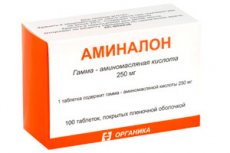新出版物
阿米那龙
阿列克谢·克里文科,医学审稿人
最近審查:04.07.2025
最近審查:04.07.2025

阿米那酮,又称γ-氨基丁酸 (GABA),是人类和许多其他动物中枢神经系统中天然存在的氨基酸类神经递质。它在调节神经元兴奋方面发挥着关键作用。γ-氨基丁酸对神经元信号有抑制作用,这意味着它会降低神经细胞的兴奋,从而导致神经活动减少。
在医学上,γ-氨基丁酸被用作治疗各种疾病的药物,例如焦虑症、失眠症和癫痫。也有人假设它具有减轻压力和改善情绪的潜在作用。
適應症 阿米纳洛纳
- 焦虑症:GABA 可能有助于减轻焦虑症患者的焦虑和紧张。
- 失眠:由于其镇静特性,GABA 可能有助于减少入睡时间并改善睡眠质量。
- 癫痫:GABA 在某些情况下用于治疗癫痫,因为它可能有助于降低神经细胞的兴奋性并预防癫痫发作。
- 压力和情绪障碍:一些研究表明 GABA 可能有助于控制压力和改善情绪,尽管这些影响需要进一步研究。
- 高血压:研究还表明,GABA 可能有助于降低某些人的血压。
- 肠易激综合征 (IBS):一些证据表明 GABA 可能有助于减轻 IBS 症状,如腹痛和肠道功能障碍。
發布表單
片剂和胶囊:GABA 通常以片剂或胶囊形式提供,方便使用和服用。它们可以用水口服。
藥效學
- 抑制性神经传递:GABA 是中枢神经系统的主要抑制性神经递质。它通过降低神经元的兴奋性和活性来影响神经元。GABA 与位于神经元表面的 GABA 受体结合。这会激活氯离子通道,导致氯离子进入神经元,使其膜高度极化,从而降低神经元的放电可能性。
- 抗焦虑和镇静作用:由于GABA对神经元具有抑制作用,因此可用于减轻焦虑和压力。它还具有镇静作用,有助于改善睡眠质量并降低神经系统的兴奋性。
- 抗惊厥作用:GABA 可以通过降低神经元兴奋性和稳定大脑的电活动来帮助预防癫痫发作和蔓延。
- 对情绪和行为的可能影响:一些研究表明,GABA 可能通过与其他神经递质和神经调节剂的相互作用影响情绪和行为。
- 血压调节:一些研究表明,GABA 可能有助于降低某些人的血压,尽管这种作用的机制需要进一步研究。
藥代動力學
- 吸收:由于GABA的亲水性和高分子量,口服时其在肠道中的吸收率较低,这会显著降低其生物利用度。
- 分布:GABA 均匀分布于全身的组织和器官,包括中枢神经系统,在那里它发挥神经递质的作用。
- 代谢:在体内,GABA 在 γ-氨基丁酸脱羧酶 (GAD) 的作用下快速代谢为谷氨酸。谷氨酸是合成其他神经递质(如谷氨酸和 GABA)的前体。
- 消除:GABA 通常以代谢物(包括谷氨酸)的形式经肾脏排出体外,并以未经修饰的形式经尿液排出。其半衰期(血液中 GABA 浓度下降一半所需的时间)可能因生理和病理因素而异。
劑量和管理
使用方法:
- 阿米那隆是口服的,通常为片剂形式。
- 应在饭前服用药片,并饮用足量的水。
建议剂量:
对于成年人:
- 常用剂量:每天 2-3 次,每次 500 毫克(2 片,每片 250 毫克)。
- 每日最大剂量:3克(12片,每片250毫克)。
对于儿童:
- 1-3岁儿童:每日2次,每次1-2片(250-500毫克)。
- 4-6 岁儿童:每日 2 次,每次 2 片(500 毫克)。
- 7岁以上儿童:每日2次,每次2-3片(500-750毫克)。
- 儿童每日最大剂量:最多 2 克(8 片,每片 250 毫克)。
治疗时长:
- 治疗过程通常为2周至3个月,取决于患者的病情和治疗的效果。
- 在医生的建议下,1-2个月后可以重复治疗。
特别说明:
- 逐渐增加剂量:建议从最小剂量开始治疗,逐渐增加剂量至治疗剂量,以减少副作用的风险。
- 病情监测:长期使用该药物期间,建议定期进行医学检查以评估肝肾功能,尤其是对于患有慢性疾病的患者。
- 老年患者:对于老年人,可根据总体健康状况和伴随疾病的情况调整剂量。
接收模式示例:
- 早上:早餐前服用 500 毫克(2 片,每片 250 毫克)。
- 白天:午餐前服用 500 毫克(2 片,每片 250 毫克)。
- 晚上:晚餐前服用 500 毫克(2 片,每片 250 毫克)。
在懷孕期間使用 阿米纳洛纳
- 对子宫内膜和胚胎发育的影响:小鼠研究表明,妊娠早期摄入GABA可能对子宫内膜和胚胎发育产生负面影响。高剂量的GABA会减少着床位点的数量,并导致胚胎形态退化,这表明妊娠早期使用GABA存在潜在风险(Tian等人,2020年)。
- 神经甾体和 GABA(A) 受体的调节:孕激素等神经甾体浓度的变化可能会影响妊娠期和产后脑内 GABA(A) 受体的可塑性。这些变化与孕酮等激素调节的变化有关,而这些激素调节的变化可能会影响胎儿发育和母亲的健康 (Concas 等人,1998)。
- 安全性和毒性:一项关于GABA作为膳食补充剂安全性的审查发现,在剂量高达18克/天(持续4天)以及长期使用(120毫克/天,持续12周)的情况下,未观察到严重不良反应。然而,目前尚无关于GABA对孕妇和胎儿影响的数据,因此需要谨慎使用(Oketch-Rabah等人,2021年)。
禁忌
- 超敏性或过敏反应:已知对γ-氨基丁酸或该药物的其他成分超敏的人应避免使用它。
- 怀孕和哺乳:关于在怀孕和哺乳期间使用 GABA 的安全性的数据不足,因此在这种情况下使用前应咨询医生。
- 肝功能不全:由于肝脏可能参与许多药物(包括 GABA)的代谢和消除,因此肝功能不全的患者可能需要调整剂量或额外的医生监测。
- 服用其他药物:GABA 可能与某些药物相互作用,因此服用其他药物的患者在开始服用 GABA 之前应咨询医生,以避免潜在的不良相互作用。
- 严重的精神疾病:在某些情况下,GABA 可能会加重抑郁症或精神分裂症等精神疾病的症状,因此不建议患有这些疾病的患者使用它。
- 自身免疫性疾病:人们担心 GABA 可能会对免疫系统产生影响,因此如果您患有自身免疫性疾病,则在使用 GABA 时可能需要特别注意并接受医疗监督。
副作用 阿米纳洛纳
- 嗜睡和疲劳:有些人在服用 GABA 后可能会感到嗜睡或疲劳,尤其是在开始治疗或增加剂量时。
- 头晕:部分患者可能会出现头晕或轻微头痛。
- 胃肠道疾病:可能会出现一些胃肠道疾病,如腹泻、便秘或胃部不适。
- 过敏反应:有些人可能对 GABA 产生过敏反应,包括皮疹、瘙痒或肿胀。
- 睡眠障碍:有些人可能会出现睡眠质量的变化,例如失眠或更频繁地醒来。
- 肌肉无力或震颤:有些人可能会出现轻微的肌肉症状,如无力或震颤。
- 精神障碍:在极少数情况下,一些患者可能会出现情绪变化或精神激动。
過量
- 嗜睡和昏睡:过量服用 GABA 会导致极度嗜睡和昏睡,这在执行需要注意力和协调性的任务时可能会很危险。
- 肌肉无力:高剂量的 GABA 会导致肌肉无力甚至瘫痪。
- 呼吸困难:在极端情况下,过量服用 GABA 会导致呼吸困难,甚至呼吸停止。
- 昏迷:在某些情况下,过量服用可能会导致失去意识或昏迷。
- 其他副作用:也可能出现其他副作用,如头晕、恶心、呕吐、癫痫和心律改变。
與其他藥物的相互作用
- 中枢作用药物:作用于中枢神经系统的药物,如苯二氮卓类药物(例如阿普唑仑、地西泮)或催眠药,可能会增强 GABA 的镇静作用,导致嗜睡和昏睡感增加。
- 酒精:当 GABA 与酒精一起服用时,可能会增强镇静作用,并有产生其他副作用的风险,如极度嗜睡、头晕,甚至潜在危险的呼吸问题。
- 癫痫药物:将 GABA 与抗癫痫药物一起使用可能会改变其有效性或增加不良副作用,例如嗜睡或肌肉痉挛。
- 治疗焦虑症和抑郁症的药物:一些抗焦虑药和抗抑郁药可能与 GABA 相互作用,从而导致其镇静或抗焦虑作用增强。
- 影响心血管系统的药物:某些药物,例如β受体阻滞剂或降压药,会与 GABA 相互作用并改变其对心血管系统的影响。
- 糖尿病药物:GABA 的使用可能会与某些抗糖尿病药物相互作用,改变血糖水平。
注意!
為了簡化對信息的理解,本指令使用了藥物 "阿米那龙",並根據藥物的醫療用途官方說明。 使用前請閱讀直接用於藥物的註釋。
描述僅供參考,不適用於自我修復指導。 這種藥物的需求,治療方案的目的,藥物的方法和劑量僅由主治醫師確定。 自我藥療對你的健康有危害。

